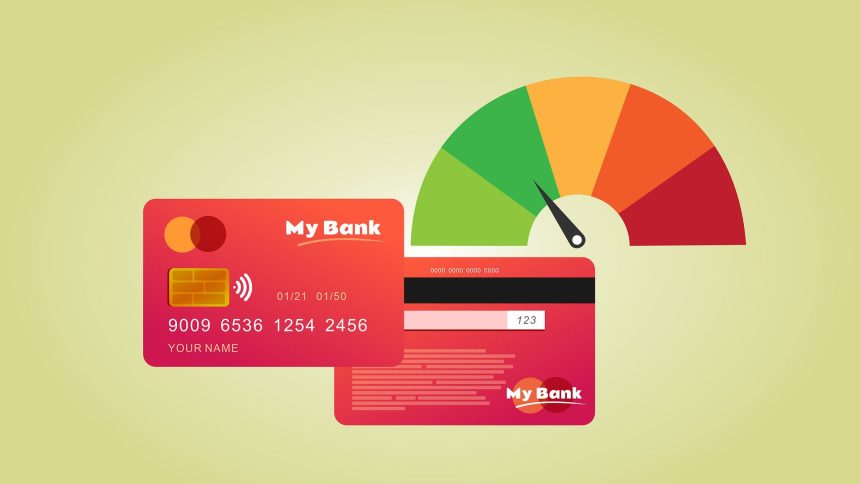A robust credit score serves as the foundation of financial well-being in the UK and can unlock a multitude of opportunities. Grasping its significance and elucidating the insights it offers constitutes an essential initial step. This article furnishes an updated and comprehensive guide to credit scores and ratings in the UK, encompassing inquiries into credit reports, credit agencies, methods for enhancing your credit rating, as well as strategies for easily and swiftly augmenting your credit score.
What is a credit score?
In the UK, a credit score is a numerical representation of an individual’s creditworthiness based on an in-depth analysis of their credit history. Lenders such as banks and credit card companies utilize these scores to evaluate the potential risk associated with lending money to consumers and minimize losses from bad debts. A higher score indicates a greater likelihood of responsible financial behaviour, making it easier for individuals to obtain loans, credit cards, and favourable interest rates.
Credit Agency in UK

The UK has three major credit agencies: Experian, TransUnion (formerly Callcredit), and Equifax. These agencies gather diverse information about individuals and businesses and determine a credit score based on distinct criteria. As independent systems, each agency follows its own set of scoring rules, resulting in variations in the scores they assign.
Experian
Experian’s highest rating is 999, which is higher than other credit agencies. The specific rating levels are as follows:
| Experian Credit Score | |
|---|---|
| 0-560 | Very Poor |
| 561-720 | Poor |
| 721-880 | Fair |
| 881-960 | Good |
| 961-999 | Excellent |
- https://www.experian.co.uk/
- +44 800 013 8888
TransUnion (formerly Callcredit)
The credit scoring agency TransUnion (formerly known as CallCredit) has a maximum credit score of 710. TransUnion shares its data with other agencies, such as credit advisors like Credit Karma (formerly Noddle), Checkmyfile, and TotallyMoney, enabling them to generate comprehensive credit scores and reports for their users. Consequently, the scores and reports provided by these platforms are sourced from TransUnion. Here is an overview of the specific score levels:
| TransUnion Credit Score | |
|---|---|
| 0-550 | Very Poor |
| 551-565 | Poor |
| 566-603 | Fair |
| 604-627 | Good |
| 628-710 | Excellent |
- https://www.transunion.co.uk/
- +44 330 024 7574
Equifax
Equifax is a globally recognized authority in consumer and corporate credit intelligence, renowned for delivering cutting-edge financial solutions that empower individuals. With an unwavering commitment to trust and a forward-thinking approach, Equifax strives to transform knowledge into innovative ideas that enhance the lives of consumers worldwide.
| Equifax Credit Score | |
|---|---|
| 0-279 | Very Poor |
| 280-379 | Poor |
| 380-419 | Fair |
| 420-465 | Good |
| 466-700 | Excellent |
- https://www.equifax.co.uk/
How to check your credit report?

These three institutions can check your credit score and obtain a credit report. After entering the page, you can enter your personal information, including name, date of birth, social security number, address, etc., according to the prompts. If you need a loan to buy a house or a car, you can check three simultaneously and then choose the one with the highest score, which is conducive to approval or a reduced loan interest rate. In addition, there are also some free websites to get credit scores, such as:
- Credit Karma
- Checkmyfile
- TotallyMoney
- ClearScore
- Credit.com
How to analyze your credit report?
A credit report is a comprehensive document encompassing your complete credit history from various sources such as credit card companies, banks, government agencies, electoral registers, and more. The specific contents may vary among different agencies but typically include:
- Personal Information: Name, Date of Birth, Current Address, Previous Address, Employer Information, etc.
- Credit Card, Home Loan, Installment Loan: Account Number, Status, Opening Date, Balance, Credit Limit, Latest Update Date, Minimum Payment, Repayment History, etc.
- Search: There are Hard and Soft Searches. Hard Search is a type of Search that you authorise the bank or credit card company to perform, which has a negative impact on the Credit Score. Soft Search is another type, such as a report requested by yourself or a search generated by a credit card company for a promotion. Soft Search has no impact on the Credit Score.
- Debt collection record(Collection)
- Public Records: Bankruptcy, Mortgage, Assets Frozen, Court Rulings, etc.
How is the credit score calculated?
Take Equifax’s formula for example, which is calculated based on the following five factors:

Payment History - 35%
The loan repayment history encompasses various types of credit accounts, including credit cards, instalment loans (such as car loans, housing loans or student loans), corporate credit accounts, financial company accounts, and public records. It evaluates the timeliness of payments, occurrences of late or missed payments, as well as instances of foreclosure or bankruptcy. This factor contributes significantly to the overall credit score, with a weightage of 35%.
Balance Owed - 30%
The calculation of this component primarily relies on the user’s credit card limit. Your credit utilization ratio holds significant importance, as fully utilizing your credit limit each month can adversely impact your credit score. It is advisable to keep your usage within the range of 30% to 50% of your limit. While applying for multiple credit cards may temporarily lower your credit score, it ultimately contributes positively in the long run by increasing the overall available credit and reducing the proportionate utilization rate. Furthermore, although a dormant card that remains unused over an extended period will not be included in the credit report, cancelling it due to prolonged inactivity can have negative repercussions.
Credit History - 15%
The credit account age is calculated by taking into consideration both the oldest and most recently opened accounts, resulting in an average. In essence, opening a new credit card or closing a long-standing one will have a negative impact on the score.
Credit Mix - 10%
A credit portfolio refers to a collection of various credit accounts, such as mortgages, loans, and credit cards. Typically, lenders and creditors prefer to observe a diversified credit portfolio.
New Credit Accounts - 10%
If you have a history of frequent credit card applications within a short period, it may lead the bank to perceive a potential financial constraint and subsequently lower your credit score. Failing to comprehend this could potentially trap you in an endless cycle of application rejections. It is advisable to maintain a minimum interval of six months between each new credit card application.
Factors That Could Hurt Your Credit Score
- A history of late or unpaid payments
- Going over your credit limit
- Breaking a credit agreement
- Bankruptcy, bankruptcy and county court judgments (CCJ) in your credit history
- Making too many credit applications in a short period of time
- Opening a joint account with someone with a bad credit history
- Frequently withdrawing cash from your credit card
- Failing to detect errors or fraudulent activity in your credit report
- Not voting
- Moving around a lot

How to increase credit score easily and quickly?
- Be sure to pay your bills on time, whether it’s for utilities or your monthly credit card payments. Also avoid late payments, which can lower your credit score and increase the likelihood that other companies will decline your credit.
- Timely payment of monthly bills is a foolproof method to enhance your credit score, as it effectively showcases your consistent ability to make payments on schedule.
- Make sure to vote in elections and check your credit report regularly for any errors or incorrect information, as this incorrect data could negatively affect your credit.
- In terms of financial matters, it is advisable to close any accounts that are not being used and deactivate all joint accounts that are no longer valid.
Key Steps
- Always make your payments on time
- Stay within your credit limit
- Avoid making cash withdrawals from your credit card
- Pay your credit card balances that exceed the minimum monthly payments
- Have separate personal and business credit cards
- Track your old accounts
- Be aware of connections to other people’s financial records
- Pay any outstanding county court judgments (CCJs) or defaults
Keep a healthy bank balance
- Check your credit report regularly and check for incorrect information
- Vote
- Check if you have financial ties to other people
- Pay any outstanding county court judgments (CCJs) or defaults
- Avoid payday loans
- Be careful when applying for new credit
If you’re thinking about studying in the UK, it’s crucial to find the right student accommodation. That’s where uhomes comes in. It’s a reliable platform that helps students like you find the perfect place to live in London, Manchester, Glasgow, Cardiff, Birmingham and many other cities. So far, they’ve helped more than 55,000 students successfully find their dream homes.

FAQ
The standard practice in the UK is to retain credit records for a period of six years, starting from the date of closure or settlement. These records encompass all types of credit accounts, whether they have been settled, defaulted, or closed, thereby providing lenders with a comprehensive historical overview that aids in assessing creditworthiness.
The recommended course of action is to promptly contact the credit reference agency in order to dispute any inaccuracies. This is a well-established procedure they are adept at handling, collaborating with lenders to rectify any identified errors and ensuring an accurate and equitable reflection of your credit history on your credit profile.
The initial step involves promptly reporting the incident to your bank and other financial institutions in order to initiate account freezing procedures and prevent unauthorized transactions. Subsequently, it is crucial to notify the National Fraud and Cyber Crime Reporting Centre of the fraudulent activity, ensuring a prompt investigation of your case. Additionally, contacting reputable credit reference agencies in the UK is recommended for continuous monitoring of your credit file against any suspicious activities.
The higher the credit limit, the lower the utilization of credit, which positively impacts the credit score. Additionally, a higher average credit limit is associated with a greater credit limit for newly applied credit cards.
- Call to increase your Credit limit every 6 months when you are sure of it, preferably after you have just made a large payment.
- Call to increase your Credit limit after you make a large purchase (like a tuition fee).
- Use a credit card that is generous on Credit limits.
If you are interested in more UK living tips. Please check following blogs!











